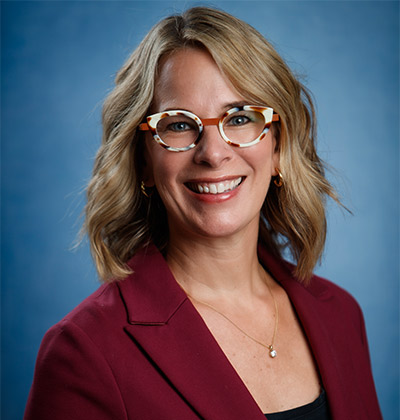Melissa Bezanson Shultz
Assistant Dean for Legal Writing | Professor of Law
Biography
Shultz is a Professor of Law and the Assistant Dean of Legal Writing at St. Mary’s University School of Law. In her current role (as well as her previous roles at Mitchell Hamline School of Law and UNT Dallas College of Law), Shultz’s teaching focuses primarily on legal writing, but she also teaches Texas family law and professional responsibility. Shultz’s scholarship focuses on legal writing, legal education, law school curricular reform, and the NextGen bar exam. She is dedicated to the incorporation of skills teaching and assessment into all law school classes to better prepare law students for the practice of law.
Shultz graduated from Grinnell College with a B.A. in English and a concentration in global development and The University of Texas School of Law. After graduating from law school, Shultz joined the firm of King & Spalding LLP in Washington, D.C., where her practice focused on commercial litigation and criminal and civil antitrust law. After moving back to Texas, Shultz started her own freelance law firm (ReLegal Group) and then went to work in the legal ethics department of Gardere Wynne and Sewell LLP. Shultz is licensed in Texas and Washington, D.C.
Publications
- Practice Perfect: Professional Responsibility (Aspen Pub., 2024) (co-authored with Andy Perlman and Nancy Rapoport)
- Legal Writing Made Simple: A Step-by-Step Approach (Carolina Press, 2024) (co-authored with Christine Tamer).
- Professor, Please Help me Pass the Bar Exam: #NextGenBar2026, 71 J. Leg. Ed. 141 (Spring 2023).
- Change is Inevitable. Exhaustion is Optional: Get Your Students NextGen Ready with an Upcycled MPT, 36 Second Draft (May 2023) (co-authored) (co-authored with Maggie Eilertson).
- Writing by Numbers: Legal Writing Made Easy (Texas Edition) (Carolina Press, Jan. 2020) (co-authored with Christine Tamer).
- The Adaptable Law Professor: Ten Tips for Keeping the Magic of an Oral Argument Competition Alive on Zoom, Syllabus (Am. Bar. Assoc., Winter 2021) (co-authored with Christine Tamer).
- The Basics of Protective Orders in Dallas and its Contiguous Counties, Accessible Law by UNT Dallas L. Rev. (2020).
- Mastering Legal Analysis: Achieving the Best by Understanding the Bad, UNT Dallas Center for Writing Excellence (2018).
- How to Locate a Writ or Petition History and Create a Greenbook Citation for Civil Appellate Cases in Texas, UNT Dallas Center for Writing Excellence (2017).
Presentations
- “Golden Ticket”: Using PR to Teach and Assess UBE and NextGen Skills, AASE Annual Conference (forthcoming Boise, May 2024).
- Pedagogy Pivots: Leading Legal Education’s Transition to the NextGen Bar Exam, AALS Annual Meeting (San Diego, Jan. 2023).
- A Grimm Future? Pick a Nextgen Curricular Change that Fits Your School—the Wee-little Change, the Medium-sized Change, or the Great-big Change, Legal Writing Institute Workshop (Charleston, Dec. 2022).
- Rediscovering Your Inner Writing Guru: Top Legal Writing Conventions to Remember and Top Legal Writing Conventions to Forget, CLE for Dakota County (Nov. 2022).
- NextGen Bar Exam, Southeastern Association of Law Schools (Summer 2022) (invited).
- NextGen Fullsend, AALS Clinical Conference (May 2022) (invited).
- The End Game: Teaching Legal Writing by Engaging Students in Social Media, Networking, and Reputation Building Exercises, ALWD Biennial Conference (June 2021).
- From IRAC to CRuPAC: Does Structure Matter in Legal Analysis?, a Continuing Legal Education Course offered via videoconference and on-demand to MHSL alumni (May. 2021).
- Keeping the Magic of an Oral Argument Competition Alive on Zoom (Pandemic be Damned), NOVA Law Rev. Legal Writing Symposium (Feb. 2021).
- From IRAC to CRuPAC: Does Structure Matter in Legal Analysis? a Continuing Legal Education course prepared for the Court of Appeals Quill & Bagel Society (Feb. 2021).
- The Adaptable Law Professor: Ten Tips for Keeping the Magic of an Oral Argument Competition Alive on Zoom, Legal Writing Institute One-Day Conference at California Western (Dec. 2020).
- Back to the Basics: Top Tips to Improve Your Legal Writing, a Continuing Legal Education course offered via video conference and on-demand to MHSL alumni (Oct. 2020).
- Using Multiple Assessments to Improve Learning Outcomes for the Modern Law Student, Institute for Law Teaching and Learning Conference (June 2019).
- Legal Writing for New Associates, Haynes & Boone, LLP (Oct. 2018).
- Legal Writing Made Easy (June 2018) Continuing Legal Education course offered to attorneys and alumni, UNT Dallas College of Law.
- Legal Writing Made Easy (Aug. 2018), a Continuing Legal Education course offered via video conference to eighteen offices of Legal Aid of North Texas.
- Legal Writing in an Electronic World (Jan. 2017) at the TIPPS section of the Dallas Bar luncheon.
- Teaching Legal Writing in a Multilingual World, Legal Writing Institute’s Rocky Mountain Conference (Mar. 2016).
- The Art and Ethics of Lawyering in a Bilingual World (Jan. 2016, Dallas Bar Association).
- Keep It Simple: Giving Feedback in Large Classes, Southeastern Association of Law Schools Conference (July 2019).
- Relativity of Miracles, Texas State Bar Meeting (July 2017).
Melissa Bezanson Shultz
Assistant Dean for Legal Writing | Professor of Law

Contact Information
Education
- J.D., The University of Texas School of Law, Austin, Texas, 2002
- B.A., Grinnell College, Grinnell, Iowa, 1998
License to Practice
- Texas
Specialties and Courses
- Legal Research and Writing
- Advanced Legal Writing
- Professional Responsiblity
- Texas Family Law
- From Bar to Practice Readiness